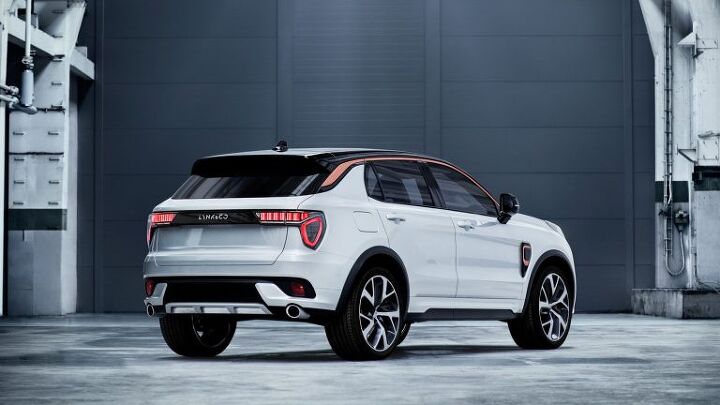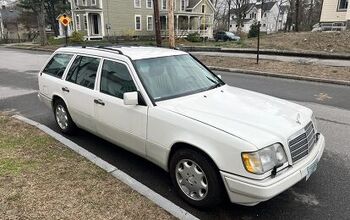From China and Sweden, With Love: Lynk & Co Promises 'Always Connected' Compact SUV in the U.S. for 2018

New car brands don’t come around every day, and when they do, they never launch with a real, honest-to-God, physical car at the ready. I should say “almost never,” as Chinese automaker Geely’s collaboration with Volvo has already yielded automotive fruit.
That comes as a relief after the company told us to “think beyond the car.” Sure, Lynk & Co’s marketing hype is still omnipresent, but now there is something tangible to attach it to.
Automotive News tells us the compact SUV is called 01 and will be a hybrid, powered by a 1.5 liter three-cylinder gasoline engine paired with an electric motor. The little crossover also rides on the Compact Modular Architecture platform, which it shares with its sibling from Sweden, the upcoming XC40.
Currently, transmission options include a manual or a seven-speed, dual-clutch automatic.
Lynk & Co is also building a 2.0-liter inline four. Both it and the 1.5-liter engine will be built in China with technology on loan from Volvo. The company also plans to add a compact sedan and other models to its fleet using the shared platform with Volvo.
While there’s no actual numbers being tossed around, Lynk & Co says it wants to keep vehicle prices low through a sales and distribution model based on online retailing and direct sales from its own stores. Avoiding the large distribution fees associated with dealerships should offer significant savings, according to the company. Lynk wants to go as far as delivering the 01 directly to the buyer’s home, and picking it up from the owner for servicing.
“Our aim is to enrich and simplify car ownership by re-defining how cars are bought, owned, connected, serviced and used,” Alain Visser, Lynk’s senior vice president, said in a statement.
How this can work in the U.S. — where many states have strict provisions against direct-to-consumer car sales — is unknown. Lynk also plans to keep prices down by offering a set number of vehicle trims to minimize build configurations and lower its manufacturing costs.
As for the accuracy of its “born digital” slogan, the company has been working with Microsoft and Alibaba to create a digital customer infrastructure, while Ericsson has helped design a car-connectivity cloud. All models will come with a large central console and be permanently connected to the Internet and its own inter-vehicle cloud network. This allows the owner to provide others with access to the vehicle using a shareable digital key. Owners can then use the Lynk app to control and monitor their car from a smartphone, tablet, or computer.
The Lynk & Co 01 will arrives in the Chinese market in 2017, followed by Europe and the United States.
[Images: Lynk & Co]

A staunch consumer advocate tracking industry trends and regulation. Before joining TTAC, Matt spent a decade working for marketing and research firms based in NYC. Clients included several of the world’s largest automakers, global tire brands, and aftermarket part suppliers. Dissatisfied with the corporate world and resentful of having to wear suits everyday, he pivoted to writing about cars. Since then, that man has become an ardent supporter of the right-to-repair movement, been interviewed on the auto industry by national radio broadcasts, driven more rental cars than anyone ever should, participated in amateur rallying events, and received the requisite minimum training as sanctioned by the SCCA. Handy with a wrench, Matt grew up surrounded by Detroit auto workers and managed to get a pizza delivery job before he was legally eligible. He later found himself driving box trucks through Manhattan, guaranteeing future sympathy for actual truckers. He continues to conduct research pertaining to the automotive sector as an independent contractor and has since moved back to his native Michigan, closer to where the cars are born. A contrarian, Matt claims to prefer understeer — stating that front and all-wheel drive vehicles cater best to his driving style.
More by Matt Posky
Latest Car Reviews
Read moreLatest Product Reviews
Read moreRecent Comments
- ToolGuy I do like the fuel economy of a 6-cylinder engine. Will be watching this with interest. 😉
- Carson D I'd go with the RAV4. It will last forever, and someone will pay you for it if you ever lose your survival instincts.
- THX1136 A less expensive EV would make it more attractive. For the record, I've never purchased a brand new vehicle as I have never been able to afford anything but used. I think the same would apply to an EV. I also tend to keep a vehicle way longer than most folks do - 10+ years. If there was a more affordable one right now then other things come to bear. There are currently no chargers in my immediate area (town of 16K). I don't know if I can afford to install the necessary electrical service to put one in my car port right now either. Other than all that, I would want to buy what I like from a cosmetic standpoint. That would be a Charger EV which, right now, doesn't exist and I couldn't afford anyway. I would not buy an EV just to be buying an EV. Nothing against them either. Most of my constraints are purely financial being 71 with a disabled wife and on a fixed income.
- ToolGuy Two more thoughts, ok three:a) Will this affordable EV have expressive C/D pillars, detailing on the rocker panels and many many things happening around the headlamps? Asking for a friend.b) Will this affordable EV have interior soft touch plastics and materials lifted directly from a European luxury sedan? Because if it does not, the automotive journalists are going to mention it and that will definitely spoil my purchase decision.c) Whatever the nominal range is, I need it to be 2 miles more, otherwise no deal. (+2 rule is iterative)
- Zerofoo No.My wife has worked from home for a decade and I have worked from home post-covid. My commute is a drive back and forth to the airport a few times a year. My every-day predictable commute has gone away and so has my need for a charge at home commuter car.During my most recent trip I rented a PHEV. Avis didn't bother to charge it, and my newly renovated hotel does not have chargers on the property. I'm not sure why rental fleet buyers buy plug-in vehicles.Charging infrastructure is a chicken and egg problem that will not be solved any time soon.



































Comments
Join the conversation
To me, it looks like a Camaro and a Land Rover bred. I...have no idea how to feel about it. I thought the back would be the deciding factor. Nope. Just as odd as the front.
Side view styling is a hot mess. http://i.amz.mshcdn.com/ifc9HZdtGfYMrE-ez_ttQqp5wIw=/950x534/https%3A%2F%2Fblueprint-api-production.s3.amazonaws.com%2Fuploads%2Fcard%2Fimage%2F252488%2Flynk_and_co.jpg